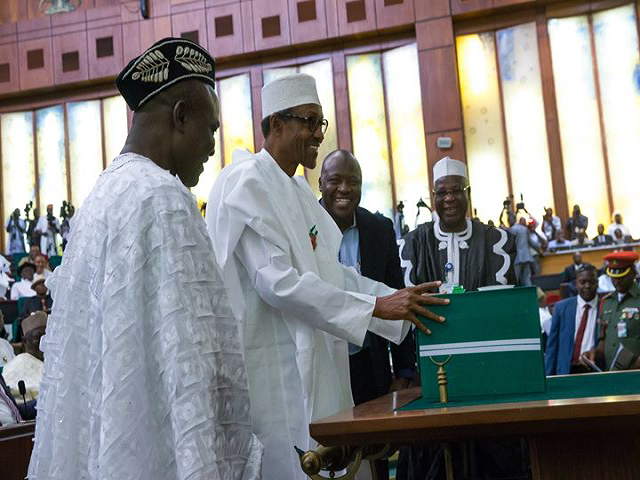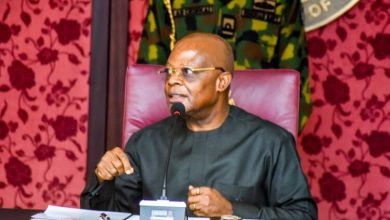Contractors are to smile in the New Year — if the Federal Government keeps its word to pay them.
They and others are being owed about N2 trillion, details of which President Muhammadu Buhari said were being compiled .
The President spoke yesterday at the presentation of a N7.298 trillion budget for the 2017 fiscal year.
Also to be cleared are outstanding electricity bills owed the troubled Distribution Companies (DisCos).
The presentation made at a joint session of the National Assembly has Power, Works and Housing receiving the lion’s share of N529 billion.
Christened “budget of recovery and growth”, its implementation will be based on the economic recovery and growth strategy.
The government proposed a budget size of N7.298 trillion, which is a nominal 20.4 per cent increase over 2016 estimates.
Of the expenditure, 30.7 per cent will be capital — in line with the government’s determination to reflate and pull the economy out of recession as quickly as possible.
President Buhari also said the fiscal plan will result in a deficit of N2.36 trillion for 2017, which is about 2.18% of the GDP.
The deficit, he said, will be financed mainly by borrowing, which is projected to be about N2.32 trillion.
He noted that the government’s intention is to source N1.067 trillion or about 46% of the borrowing from external sources; N1.254 trillion will be borrowed from the domestic market.
On expenditure estimates, Buhari said the proposed aggregate expenditure of N7.298 trillion will comprise: statutory transfers of N419.02 billion; debt service of N1.66 trillion; sinking fund of N177.46 billion to retire certain maturing bonds; non-debt recurrent expenditure of N2.98 trillion; and Capital expenditure of N2.24 trillion (including capital in statutory transfers).
The President added that on statutory transfers, the government increased the budgetary allocation to the Judiciary from N70 billion to N100 billion.
The increase in funding, he said, is meant to enhance the independence of the judiciary and enable it perform effectively.
Buhari said that the plan, which builds on the 2016 Budget, provides a clear roadmap of policy actions and steps designed to bring the economy out of recession and to a path of steady growth and prosperity.
The President noted that as the country continues to face the most challenging economic situation in its history, nearly every home and nearly every business is affected one way or the other.
The President said that in 2017, the government will focus on the rapid development of infrastructure, especially rail, roads and power.
He added that efforts to fast-track the modernisation of the railway system would take priority.
According to him, in 2016, the government made much progress getting the studies updated and financing arrangements completed.
He noted that in 2016, the government conducted a critical assessment of the power sector value chain, which is experiencing major funding issues.
He said that although the government, through the Central Bank of Nigeria (CBN) and other Development Finance Institutions, had intervened, it was clear that more capital was needed.
He said the government must also resolve liquidity in the sector, adding that it made provisions in the new budget to clear its outstanding electricity bills.
One issue that the Federal Government is committed to dealing with frontally, he said, is its indebtedness to contractors and other third parties.
He said the government was at an advanced stage of collating and verifying these obligations, some of which go back 10 years, and estimated at about N2 trillion.
The President said the government would continue to prioritise defence, spending “till all our enemies, within and outside, are subdued”.
Buhari said they restricted travel costs, reduced board members’ sitting allowances, converted forfeited properties to Government offices to save on rent and eliminated thousands of ghost workers.
“These and many other cost reduction measures will lead to savings of close to N180 billion per annum to be applied to critical areas, including health, security and education,” he said.
He explained that the effort to diversify the economy and create jobs would continue with emphasis on agriculture, manufacturing, solid minerals and services.
Buhari noted that non-oil revenues, largely comprising Companies Income Tax, Value Added Tax, Customs and Excise duties, and Federation Account levies are estimated to contribute N1.373 trillion.
He said the government set a more realistic projection of N807.57 billion for Independent Revenues, “while we have projected receipts of N565.1 billion from various recoveries”. Other revenue sources, including mining, amount to N210.9 billion.
Buhari said the 2017 budget was based on a benchmark crude oil price of $42.5 per barrel; an oil production estimate of 2.2 million barrels per day; and an average exchange rate of N305 to the US dollar.
On this year’s budget’s performance, the President said: “In 2016, the budget was prepared on the principles of zero based budgeting to ensure our resources were prudently managed and utilised solely for the public good.”
The President proposed expenditure on key capital spending provisions in the Budget to include Power, Works and Housing: N529 billion; Transportation: N262 billion; Special Intervention Programmes: N150 billion. Defence: N140 billion; Water Resources: N85 billion; Industry, Trade and Investment: N81 billion; Interior: N63 billion; Education N50 billion; Universal Basic Education Commission: N92 billion Health: N51 billion Federal Capital Territory: N37 billion;
Niger Delta Ministry: N33 billion; and Niger Delta Development Commission: N61 billion.
Buhari said N100 billion had been provided in the Special Intervention programme as seed money into the N1 trillion Family Homes Fund that will underpin a new social housing programme.
“This substantial expenditure is expected to stimulate construction activity throughout the country,” he said
He added that efforts to fast-track the modernisation of “our railway system will receive further boost through the allocation of N213.14 billion as counterpart funding for the Lagos-Kano, Calabar-Lagos, Ajaokuta-Itakpe-Warri and Kaduna-Abuja railway projects. As I mentioned earlier, in 2016, we invested a lot of time ensuring the paper work is done properly while negotiating the best deal for Nigeria. I must admit this took longer than expected but I am optimistic that these projects will commence in 2017 for all to see.”
President Buhari noted that given the emphasis placed on industrialisation and supporting SMEs, N50 billion had been set aside as Federal Government’s contribution for the expansion of existing, as well as the development of new, Export Processing and Special Economic Zones.










